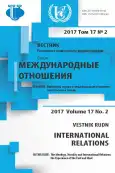“The West” and “Non-West” in the Space of International Relations Theory
- Autores: Alekseeva T.A.1
-
Afiliações:
- MGIMO University of Ministry of Foreign Affairs of the Russian Federation
- Edição: Volume 17, Nº 2 (2017): The Ideology, morality and international relations: the experience of the East and West
- Páginas: 217-232
- Seção: THEMATIC DOSSIER
- URL: https://journals.rcsi.science/2313-0660/article/view/338937
- DOI: https://doi.org/10.22363/2313-0660-2017-17-2-217-232
- ID: 338937
Citar
Texto integral
Resumo
Recently the question of “pro-Western” orientation of the IR theory turned to become in the center of the academic discussions. Its critics as well as the adherents of “non-Western” theories are partly right. Really, during more than one and a half century the theory of international relations, born and developed mostly in the West had been mostly supporting the ideas, being forms first in Europe, later in the USA. The Anglo-Saxon authors are still dominating in the discipline, not only quantitatively (the huge scale of the publications of literature and professional magazines in English plus influence of the universities and scientific centers) as well as qualitatively (impressive financing opens the possibilities for the working out of the new ideas and the development of the ideas of different “schools” of thought - political realism, liberalism, constructivism, postmodernism, post-Marxism etc.). In the theories of IR was felt ideological biases. But on the wave of decolonization and later, in the context of the rising of Asian and other countries in world politics, the “Western” dominance was challenged by the IR-scholars from PR of Chine, India etc., who try to construct their own theories of international relations. The balance is slowly but continuously changing. But “Non-Western” theories are also not free from the ideological biases. Quite often they reject or severely criticize “Western” theories just because of their origin. Even more often they in fact continue to develop the same “Western” ideas, just adding to them the local thinker’s names or mentioning some national traditions or religious and cultural heritage. But if the Theory of international relations is a science, then, strictly speaking, in what country its main personalities were born and what language they were speaking, is not important. Obviously, the elements of ideology would be present. Just like any other social science, which deals not only with structures, but with human beings as well, it would be inevitably ideological. But it does not mean that theory may be identified with ideology. To solve this problem is possible through deconstruction of the theories, their “cleaning” of too obvious ideological moments - so the position of the IR scholar has to be a priori critical but preserving already achieved essence.
Palavras-chave
Sobre autores
Tatyana Alekseeva
MGIMO University of Ministry of Foreign Affairs of the Russian Federation
Autor responsável pela correspondência
Email: ataleks@mail.ru
Moscow, Russia
Bibliografia
- Alekseeva, T. A. (2016). Contemporary Political Thought (20—21 c.). Political Theory and International Relations. Moscow: Aspekt-press. (In Russ.).
- Aron, R. (1984). Paix et Guerre entre les nations. Paris.
- Ashworth, L. (2014). A History of International Thought. From the Origins of the Modern State to Academic International Relations. New York: Routledge.
- Badie, B. (2016). Has History Restarted? International Trends, 14, 2 (45), 6—22. (In Russ.).
- Batalov, Je. Ja. (2014). American Political Thought of the 20 c. Moscow: Progress-Tradicija. (In Russ.).
- Cox, R. (1981). Social Forces, States, and World Orders: Beyond International Relations Theory. Millennium-Journal of International Studies, 10, 126—155.
- Dunne, T., Hansen, L. & Wight, C. (2013). The End of International Relations Theory? European Journal of International Relations, 19 (3), 405—425.
- Hobson, J. M. (2012). The Eurocentric Conception of World Politics. Western International Theory. 1760—2010. Cambridge: Cambridge University Press.
- Hoffman, S. (1987). An American Social Science: International Relations. In: Janus and Minerva: Essays in the Theory and Practice of International Politics. Ed. by Stanley Hoffman. Boulder, CO: Westview Press, pp. 3—24.
- Jordan, R., Malinyak, D. & Oala, O., et al. (2009). One Discipline or Many? TRJR Survey of IR Faculty in Ten Countries. In: Teaching Research and International Policy Project. Research and International Policy Project. New York: Institute for the Theory and Practice of International Relations: The College of William and Mary.
- Kuvaldin, V. B. (2009). The Global World: economics, politics, international relations. Moscow: Magistr. (In Russ.).
- Little, R. (2000). The English Schools’ Contribution to the Study of International Relations. European Journal of International Relations, 6 (3), 395—422.
- Quirk, J. & Vigneswaran, D. (2005). The Construction of Edifice. The Story of a First great debate. Review of International Studies, 31 (5), 89—107. doi: 10.1017/s0260210505006315.
- Roesch, F. (2014). Émigré Scholars and the Genesis of International Relations. A European Discipline in America? London: Palgrave Macmillan.
- Said, E. (2003). Orientalism. London: Penguin Books.
- Thies, C. G. (2002). Progress, History and Identity in International Relations Theory: The Case of Idealist-Realist Debate. European Journal of International Relations, 8 (2), 147—185.
- Turton, H. L. (2016). International Relations and American Dominance: A Diverse Discipline. Sheffield: University of Sheffield Press.
- Vitalis, R. (2000). The Graceful and Generous Liberal Gesture: Making Racism Invisible in American International Relations. Millennium: Journal of International Studies, 29 (2), 331—356.
- Zubok, V. & Shirjaev, Je. (2015). Introduction to Reader. In: Contemporary Science of International Relations Abroad. Ed. by I. S. Ivanov. In 3 Vol. Moscow: RSMD, pp. 14—31. (In Russ.).
Arquivos suplementares









